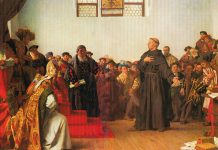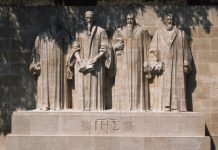Tag: reformation
Luther’s protest is not over
In January 2014, in what catholic.org called a historic gesture, Pope Francis sent a message of unity, recorded on a mobile phone, to charismatic and Pentecostal leaders attending a conference organised by Kenneth Copeland Ministries.
The Second Coming Files: A 2000-Year Inquiry | Part IV: The world in the 18th-19th...
In the first three articles in this series, we examined what Scripture says about the coming of Jesus, and also how the biblical books of Daniel and Revelation remain the foundations of understanding time.
When the face of the world changes | The epistemological significance of the Protestant Reformation
After Jesus was born—that is, in the era we call Anno Domini (AD)—the history of mankind was different from that of Christianity. As it is known, the latter was not the history of a triumphant march of Christianity towards its universalization and the unification of the human race. On the contrary, this history can rather be characterised as a manifestation of “the great controversy”, according to the expression christened by Ellen White in the book with the same name, written in 1888. It was a controversy with many heroes and victims, which wreaked havoc on human civilization, culture, and religion.
The Dutch Arminians
On the continent jaded by an irrelevant religion, a new denomination appeared, in addition to the Lutheran, Calvinist, and Anglican Protestants—the Arminians.
John Calvin
In The Legacy of John Calvin, David W. Hall divides leaders into two categories. Some predict the future, and others change it. Calvin, Hall said, is in the second category.
The Church of England | Anglicanism between Rome and Geneva
The term "Anglicanism" denotes the system of doctrine and practice of those Christians who are in communion with the archbishop of Canterbury. The beginnings of the Church of England are linked to the reign of Henry VIII and Edward VI, while the initial formulation of Anglican principles is linked to the reign of Elizabeth I, during whose reign a middle ground was politically established ("via media", in Latin) between the Roman papacy and the Reformed dissents of Geneva, and Anglicanism as a doctrinal system took shape.
The Pentecostal movement: Pentecostalism and the Reformation
Pentecostalism has its origin in the Greek word Pentecost, which means “fifty” and refers to the receiving of the Holy Spirit by the apostles on the feast of Pentecost in Jerusalem, followed by speaking in tongues (glossolalia). However, this Pentecostal phenomenon predates the Pentecostal movement which began at the beginning of the 20th century.
The Baptist Church
The Baptist Church has made significant contributions to religious life by embracing the principle of separation of church and state and the principle of religious freedom.
How (not) to clip the wings of reformation
In the fourteenth and fifteenth centuries, Europe was hit hard by several disasters, the proportions of which are difficult to imagine today.
Reformation: The real face of Christianity
The Great Reformation was not a simple schism within Western Christianity. It was not just a religious and political movement. The Protestant Reformation, with its particular spirit and principles, was, first and foremost, a return to the true source and values of Christianity—an attempt to restore.





















